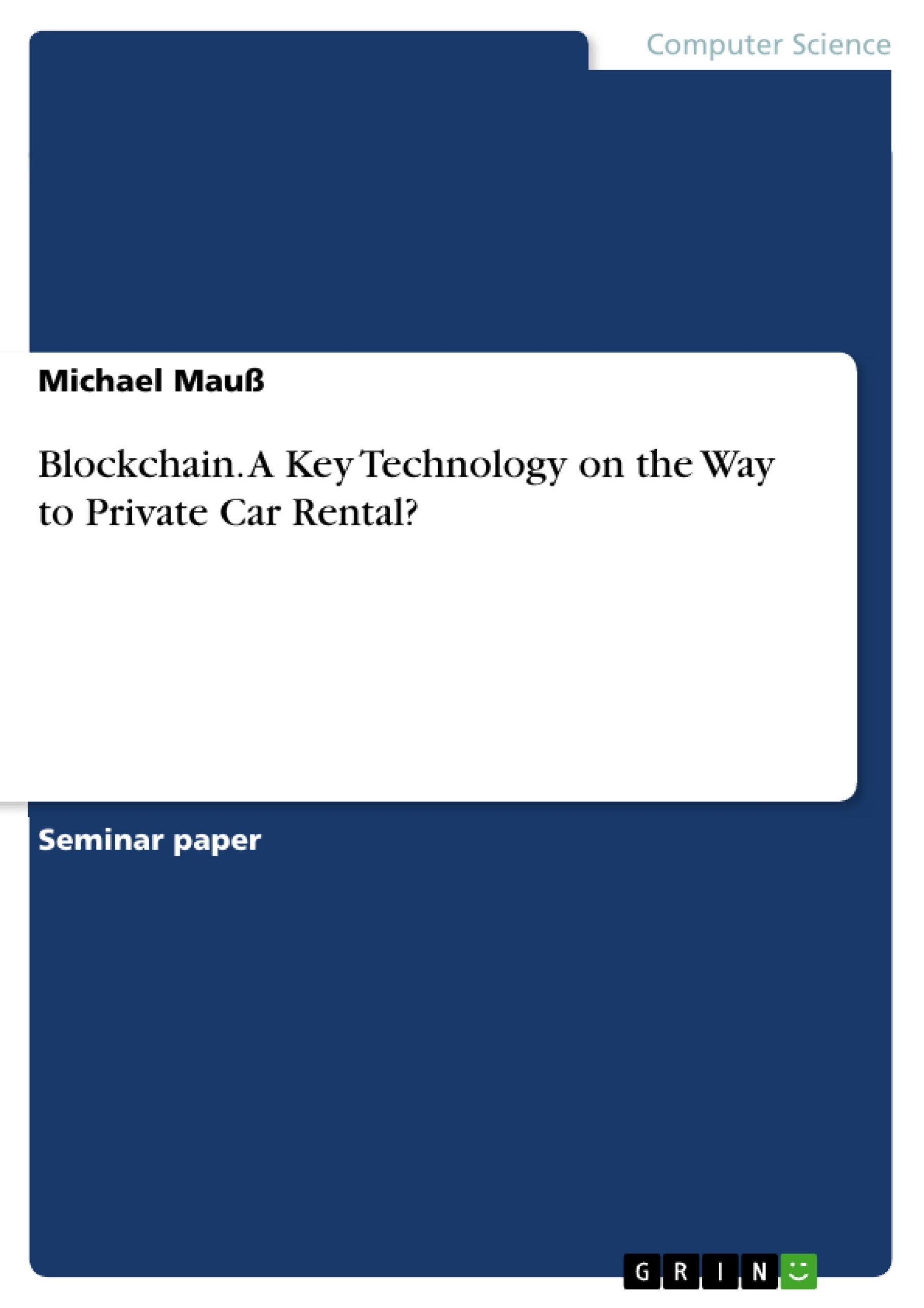This paper explores whether Blockchain could be a key technology on the way to private car rental. After the problem statement and the situation assessment, there is an in- troduction to the blockchain itself and specifically. After that, the recommendations – for im- proving car sharing nowadays with private car rental over the blockchain – will be discussed with a view to the implementation and the solved problem. In the end, we will have a look into the near future and at the next steps that need to be done for the realization of the idea.
In the current climate crisis, the target in the western world is to reduce the amount of fossil energy and raw materials. Every less produced car is, therefore, a step in the right direction to a more sustainable future. According to the Federal Environment Agency of Germany, one car-sharing car could replace four to ten private cars. Today's carsharing vehicles are newer on average and therefore have lower fuel consumption and carbon dioxide emissions than the average private car. In addition, car-sharing users often combine car-sharing journeys with public transport, so that utilization there increases and no additional fuel is consumed. Be- sides that, they also use bicycles more often or go by foot, instead of driving a car. In the future, the streets should be used less, the more car-sharing users there are, and the emission- neutral traffic routes such as cycle paths will have better utilization.
Besides these positive aspects, car sharing today has many issues to deal with. Low customer numbers and problems with profitability come together with availability only in the city center and a not completely satisfying service. For solving these problems private car rental over blockchain could be an alternative.
Inhaltsverzeichnis (Table of Contents)
- Introduction
- Problem Statement
- Situation Assessment
- Blockchain Technology
- Blockchain Technology in General
- Smart Contracts
- Blockchain for private car rental
- Recommendation
- Financial incentives
- Trust
- Insurances
- Comfort
- Key Delivery
- Fueling
- Paying
- Options
- Less Cars
- Outlook
Zielsetzung und Themenschwerpunkte (Objectives and Key Themes)
This seminar work investigates the potential of blockchain technology to revolutionize private car rental and contribute to a more sustainable future. The main objective is to explore the use of blockchain in overcoming the challenges faced by traditional car-sharing models, such as low customer numbers, profitability issues, and limited availability.
- The environmental benefits of car sharing and the need for broader adoption.
- The challenges and limitations of existing car-sharing models.
- The potential of blockchain technology to enhance car-sharing services.
- The key features and benefits of using blockchain for private car rental.
- The implementation considerations and future outlook for blockchain-based car sharing.
Zusammenfassung der Kapitel (Chapter Summaries)
- Introduction: This chapter introduces the concept of car sharing as a key pillar in achieving environmental sustainability and highlights its benefits, including lower fuel consumption, reduced carbon emissions, and increased public transport usage. It also discusses the existing challenges faced by car-sharing services, such as low customer numbers, profitability issues, and service limitations.
- Problem Statement: This chapter focuses on the challenges of car sharing in Germany, highlighting the low adoption rate and its profitability constraints. It explores the reasons why car sharing has not yet become a mainstream alternative to car ownership, including user attitude, service limitations, and insurance complexities.
- Situation Assessment: This chapter analyzes the current state of the car-sharing industry, highlighting the emergence of new companies and the increasing number of users in Germany. It examines the service quality offered by car-sharing companies and identifies the main reasons why people choose not to share their cars, focusing on trust and insurance concerns.
- Blockchain Technology: This chapter introduces blockchain technology and its potential applications in various sectors. It discusses the concept of smart contracts and how blockchain can be applied to private car rental, highlighting the benefits of secure transactions, increased trust, and enhanced transparency.
- Recommendation: This chapter outlines specific recommendations for improving car sharing through the implementation of blockchain technology. It focuses on the potential benefits of blockchain in addressing key challenges, such as financial incentives, trust issues, insurance complexities, and user comfort.
Schlüsselwörter (Keywords)
This seminar work focuses on the application of blockchain technology to the car-sharing industry, particularly in the context of private car rental. Key concepts and themes include car sharing, sustainability, environmental benefits, blockchain, smart contracts, trust, insurance, and user experience.
- Quote paper
- Michael Mauß (Author), 2022, Blockchain. A Key Technology on the Way to Private Car Rental?, Munich, GRIN Verlag, https://www.hausarbeiten.de/document/1285203


